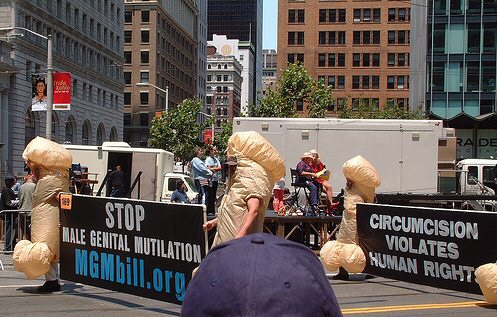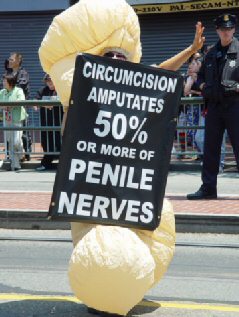|
ABC news
June 4, 2008
Female hormones key to HIV prevention
PM - Wednesday, 4 June , 2008 18:22:00
Reporter: Ashley Hall
MARK COLVIN: Researchers in Melbourne believe they've found another weapon to fight HIV AIDS.
For more than 20 years, public health experts have battled against the disease armed with little more than a safe-sex message and some condoms.
But now they've discovered that applying the female hormone, oestrogen, to the penis can prevent a man from becoming infected with the virus.
And they say the essential ingredient is cheap and easy to produce.
Ashley Hall reports.
ASHLEY HALL: It's a discovery that could provide public health professionals with the magic bullet they need to curtail the break-neck speed of HIV transmission in developing countries.
The researchers say by simply rubbing an oestrogen cream into their foreskin, men could generate a barrier to stop the virus passing into their bodies from an infected sexual partner.
It stems from some earlier work which found that apart from unprotected anal sex, men are most likely to contract the disease when the virus passes through the very tender skin on the inside of the foreskin.
So they borrowed an idea from the treatment of post-menopausal women.
ROGER SHORT: After your ovaries have stopped making oestrogen, your vagina gets very thin and somewhat painful. And women get great benefit from thickening the vaginal (inaudible) with topically, locally applied oestrogen cream. We've known that for donkey's years.
ASHLEY HALL: Professor Roger Short of the University of Melbourne's Faculty of Medicine says that thickening of the tissue is a process known as keratinisation.
It happens when oestrogen comes into contact with receptor molecules on the vagina wall.
And since keratinisation is a complete barrier to the virus, Professor Short wanted to check if those oestrogen sensitive receptors were also on the penis.
ROGER SHORT: So my colleague, Doctor Andrew Pask and I applied some post-menopausal vaginal oestrogen cream to foreskins and did contact smears, which we examined under the microscope.
And low and behold, the foreskin of the penis behaves exactly like the vagina of the female and responds within 24 hours to the local application of a very weak oestrogen, by thickening and keratinising.
ASHLEY HALL: Dr Andrew Pask from the University's Department of Zoology says there's no noticeable change in skin texture.
ANDREW PASK: The foreskin itself may become more sort of flexible than it would have been beforehand. But you certainly wouldn't actually feel a physical change yourself, in the skin itself.
And yet you can actually test it by either taking a small section of the skin or by actually just looking at the amount of cells that are sloshed off the top of the skin. So in very highly keratinised skin, you get a lot of keratin actually being sloshed off the top of the skin.
ASHLEY HALL: But Professor Short says the AIDS virus won't pass through.
ROGER SHORT: You create what you could call really a natural condom. You create a biological membrane which the virus can't get through.
ASHLEY HALL: So this is 100 per cent effective?
ROGER SHORT: We don't know yet. Looking at it under the microscope, the layer of keratin is so thick it's very difficult to imagine that any virus could get through it.
ASHLEY HALL: Two years ago, Professor Short caused an upset when he called for the promotion of male circumcision as a way to reduce HIV infections in developing countries.
His research showed that the main point of HIV infection was not the head of a man's penis, but the inside of his foreskin.
But the World Health Organisation still recommends that circumcised men use a condom during sex because foreskin removal is only 55 to 60 per cent effective at preventing HIV infection.
ROGER SHORT: We have a suspicion that the reason may be that most circumcision techniques don't actually remove all the foreskin, all the inner foreskin. So there's still some there for the virus to enter.
And we could use this oestrogen cream, even in uncircumcised men, and we would hope that that might increase the protection from 60 per cent to up to nearer 100 per cent.
But that, of course, we've got to prove in a clinical trial and that still lies ahead of us.
ASHLEY HALL: The researchers say the treatment would be cheap and easy to make and distribute because the oestrogen is excreted in human urine, and any decent pharmacist could mix-up the cream.
They're even considering adding the hormone to the lubricant used on condoms. That way, the condom would protect the woman from infection and pregnancy, while the oestrogen would stop the virus passing to the man.
MARK COLVIN: Ashley Hall. |
ABC"Enough Rope"
14 April, 2003
Professor Roger Short
We call ourselves the clever country, but so often we fail to acknowledge the truly clever people. The man you're about to meet may well hold in his hands the key to stopping the spread of AIDS. Please welcome from Melbourne University, Roger Short.
Andrew Denton: Is it Doctor or Professor?
Roger Short: Professor.
Andrew Denton: Professor. My apologies — not just Roger, but Professor Roger Short. The secret weapon — you have it with you. Could you show it to us, please?
Roger Short: I've got two. Which do you want first?
Andrew Denton: Uh, whichever you choose.
Roger Short: Left or right?
Andrew Denton: Left or…left.
Roger Short: Left. Right.
Andrew Denton: Or right.
Roger Short: Well, that…that's one of the secret weapons.
Andrew Denton: Yes.
Roger Short: And the other one, which is very similar…
Andrew Denton: These are the secret weapons for stopping the spread of HIV. How does this work?
Roger Short: Well, uh, we've rediscovered a bit of history. If we read the history books, we find that lemon juice, um, or a slice of lemon, squeezed out a bit and put in the vagina, will provide women with perfect contraception. And what we've found is that not only will lemon juice or lime juice, um, inactivate sperm like that, almost immediately — it just freezes the sperm tail and stops it wriggling so that it can't fertilise the egg — but also that same juice will kill the AIDS virus. So we're trying to reinvent history and see if we find any communities around the world today that are still using either lemon juice or lime juice to see if it will protect them against sexually transmitted diseases in general, AIDS in particular, and also contraception.
Andrew Denton: I don't wish to digress but I find that, uh, the sight of Bette Midler also freezes sperm.
Roger Short: Quite a few things freeze sperm.
Andrew Denton: How did you find out about it, though? Did you deliberately go back to the history books looking for something like this?
Roger Short: Yes, I've always been interested in history and there's a wonderful book called 'History of Contraception' which I was reading. And there's no doubt that it was actually a very effective contraceptive. And I had to give a lecture in London in the National Portrait Gallery in Trafalgar Square. And I said, you know, "Isn't it amazing that in the 1920s, apparently women were using a slice of lemon as a contraceptive?" And after the end of the lecture, about 15 women came up to me and said, "You know, in those days I used lemon juice. It was all there was." And I thought, "Wow!" And then last year I was in Thailand, in Bangkok, talking to my friend Meechai Viravaidya, who's a Thai Senator and runs Thailand's family planning clinics. And as I was telling him the story, I suddenly thought, "Gosh, you silly idiot. Lemon juice, it's so acid that not only would it immobilise sperm, it should kill HIV." And I said to Meechai, "Hey, I've just had an idea." Actually in the conversation. And I've got two PhD students and I said to them, "Drop everything, and let's see, first of all, whether lemon juice does indeed immobilise sperm." And we were able to show that emphatically it does.
Andrew Denton: You've trialled it just recently on primates.
Roger Short: Yes.
Andrew Denton: And how did that go?
Roger Short: Well, we got the results on Friday, believe it or not. We persuaded the Indonesian, um, Department of Agriculture, which has a primate colony on the island of Bogor, to do some tests on these crab-eating macaque monkeys, putting a little bit of cotton wool, um, like this, um, soaked in — if you'll excuse me using your water…soaked in lemon juice and just pop that in the vagina once a day for a month. And as far as we can see, that daily treatment with that juice has caused no pathology at all, no abnormalities in the reproductive tract of any of those six moneys.
Andrew Denton: What would you say to women who are at high risk now? Would you advise them, even though you don't have the full clinical trials, to use this?
Roger Short: I feel I would say as of Friday, er, yes, it's safe. It's not going to harm you, I think I feel absolutely sure of that, and we know that it kills the virus. You need to have about half a millilitre of juice and there's actually…you'll find there's about two millilitres of juice in there. So that's more than enough.
Andrew Denton: If this turns out to be correct, if this is indeed the key to stopping the spread of AIDS, we're talking about one of the great medical breakthroughs, are we not?
Roger Short: Well, er, I think…
Andrew Denton: Don't be modest.
Roger Short: Yes, half of me hopes that that's true. I guess half of me is still sort of terrified that it might not be true, because I think all scientists, although we may appear as sort of self-confident extroverts, inside us we have this miserable little maggot of self-doubt. And if you don't have the maggot, if you don't doubt yourself, if you're not your own worst critic, then I think you're useless. But if the maggot gets too big, it kills you 'cause you never do anything.
Andrew Denton: I think you're being perhaps a little modest here. My understanding is that the World Health Organization, amongst others, are basically hanging on your next piece of research, are they not?
Roger Short: Well, I've just sent them a fax today, um, just before coming here, saying, "Hey, it looks good. Can I come to Geneva in a couple of weeks time when I'm going to be in London and just tell you the results and think how we disseminate it?" And one of the nice things about sort of going public and talking about this is that there could be somebody in this audience who has some invaluable information for me. A couple of weeks ago I gave a talk in Melbourne and one of the doctors in the audience there said to a colleague of mine after the lecture, he said, "Oh, that's interesting, Roger talking about that lemon juice. I've been working in Laos and, um, Laotian women report using lime juice quite regularly to protect themselves against sexually transmitted diseases." And if you look up the World Health Organization figures for the incidence of AIDS in Laos, it's not sort of zero, but it's incredibly low. So could it be that by going back to Laos and going to Vientiane we might actually find that all our ideas have been scooped years ago by Laotian women who've been using this for obviously quite some long time with no adverse effects? And maybe, maybe, it's actually protected them from HIV, because all the countries around them — Vietnam, Cambodia, Thailand — have very high incidences of HIV, but little Laos with 5 million people — very little HIV.
Andrew Denton: Extraordinary. I'm going to ask a question without notice here — how much government funding do you get?
Roger Short: None.
Andrew Denton: Roger Short, thanks for coming in tonight.
Roger Short: Thanks, Andrew.
|








